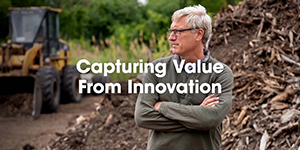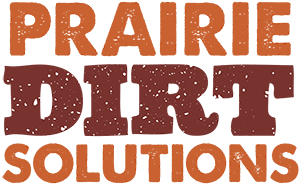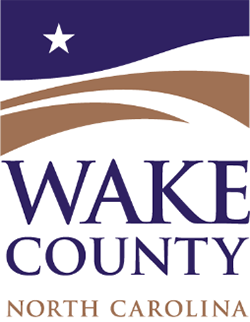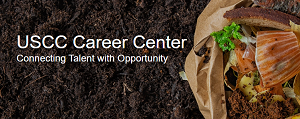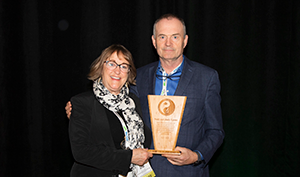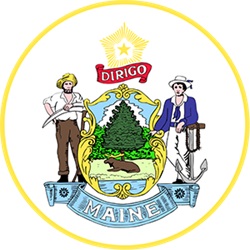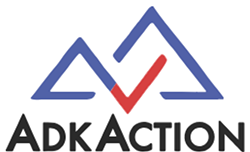 |
|||||||||||||||||||||||||||||||||||||||||||||||||||||||||||||||||||||||||||||
| Past Issues | Subscribe | Send to a Friend | compostingcouncil.org | |||||||||||||||||||||||||||||||||||||||||||||||||||||||||||||||||||||||||||||
|
By Linda Norris-Waldt, Deputy Director & Director, Advocacy, Corporate & Chapter Relations
The United States Composting Council (USCC) released its Diversity, Equity, Inclusion, and Access (DEIA) Benchmarking Study on Thursday, March 7, 2024. The study will remain open until April 15, 2024.
The USCC, like many of our member organizations, is on a journey to enrich our organization with diverse employee voices. We want to improve equitable industry growth by prioritizing access for underrepresented persons to programs. We want to learn how to include and welcome new faces at our table, whether it is our board, staff, committees, or programs.
We are happy to announce the winners of the COMPOST2024 Expo Hall Quest, which took place during the conference tradeshow on Feb. 7-8.
The Expo Hall Quest is a new interactive experience that attendees can participate in during the conference tradeshow days. Using the conference app on their mobile devices, participants can stop by an exhibitor’s booth and scan a unique exhibitor QR code, which earns them points that are tracked on a leader board. The three participants with the most points win one of the following:
The Expo Hall Quest was created to encourage more interaction with the exhibitor booths during the conference, offering exhibitors the opportunity to connect with potential clients and customers, network with other business and organizations, and develop new leads.
An Introduction to Diversity, Equity, Inclusion, and Access (DEIA)
A 30-Minute Self-Paced Training
The USCC is committed to growing diversity, equity, inclusion, and accessibility (DEIA) within the organization and throughout the compost industry by institutionalizing practices in our operations and initiatives.
In line with the US Composting Council’s commitment, the DEIA Committee has been hard at work for the last year, developing a training module that would educate USCC members about the importance and benefits of increasing DEIA.
The Environmental Protection Agency's Waste Reduction Model (WARM) is a go-to for many municipal and state solid waste planners, advocates, and compost industry members who make decisions about food waste reduction, rescue, and composting v. disposal for Climate Action Plans, as well as greenhouse gas emissions statistics and other critical carbon drawdown uses.
Having the components of WARM accurately represent the pathways for organic waste is critical for effective planning to mitigate climate change, and compost is a key to those plans. Organic waste, especially food waste, is a large contributor to greenhouse gas emissions. Composting inedible food is a way to not only reduce those emissions but also to sequester carbon in soil and plants. USCC is putting together comments around these areas with the help of scientists and climate planners in the compost industry. We ask you to help by choosing one or more of the recommendations we have made to ask for a more accurate WARM model.
As spring approaches, it’s time to think about your hiring needs for 2024. The search for quality candidates is easy with the USCC Career Center. Follow these three steps to connect with candidates in 2024:
Taking these steps will not only increase visibility of your open positions but also increase candidate applications so you can find your next great hire.
The North Carolina General Assembly approved sales tax-free compost sales to North Carolina farmers. Much of this success is thanks to the efforts of the North Carolina Composting Council’s (NCCC) Access & Advisory Committee and lobbyist Nick Wood. Congratulations to the NCCC for this major victory!
Are you an experienced composting professional interested in sharing your knowledge and expertise with the next generation of industry leaders? The USCC Young Professionals Committee invites you to sign up as a mentor for their Mentorship Program. Help shape the future of composting by guiding and supporting young professionals in their career journeys. Apply to become a mentor today by filling out this form. For any inquiries, please reach out to the YP Mentoring Committee at ypmentoring.uscc@gmail.com.
New February SoilBuilder Members: Greenway Organics
Source: Viably
In the heart of Burton, Michigan, you’ll find a company that exemplifies creativity, innovation and sustainability: Country Oaks Landscape Supply. Owned and operated by Mark Cherry, this family-owned business has been transforming waste into value for over five decades, creating and delivering high-quality compost and mulch products, with sustainability in mind.
Country Oaks Landscape Supply is steeped in a rich history that dates back to 1970 when Mark Cherry’s father laid the foundation. In 2001, Mark took over the reins of the business, keen on preserving the legacy while steering the company towards innovative horizons. Today, Country Oaks is known for its top-tier US Composting Council STA-certified compost, a testament to its commitment to quality and environmental stewardship.
Based in Oklahoma City, Prairie Dirt Solutions (PDS) likes to say that the company provides soil health solutions. As a family owned and operated business, PDS has deep Oklahoma roots. The Bergen family began a natural progression toward soil health as fifth generation Oklahoma landowners and ranchers after they embraced sustainable practices on their grass-fed beef cattle ranches. Expanding their business into new emerging markets based on client needs, the family sought to establish other businesses with similar goals.
Sister company to PDS, Eco Wood Solutions, specializes in creating high quality, IPEMA certified kiln dried hardwood for playgrounds and other commercial applications. What began with the ranches spread to both the urban and suburban community through a landfill diversion mission. Establishing Prairie Dirt Solutions seemed like the next logical step in a targeted effort to lead and answer a growing need to reduce, reuse and recycle natural materials. PDS began to produce high quality compost from wood waste and other agricultural offcuts. To test efficacy the Bergens applied the resulting compost to Bergen Ranch hay fields creating a boon of hay so big that they were nominated for and received the Oklahoma Wildlife Conservation Award for 2023. Achieving STA certification for PDS compost became an even bigger goal.
If you’ve ever wondered, “Can I recycle or compost this?,” you’re not alone. To help the community learn more about green initiatives, North Carolina's Wake County Solid Waste Management Division is hosting a series of free educational events at Wake County libraries throughout March.
“If we all do a little more to reduce the amount of waste going into our landfill, we can make a big difference in the environmental health of our county,” said Wake County Commissioner Matt Calabria. “By offering these classes, we’re making it easy for residents to learn what they can toss into their recycling or compost bins instead of the trash.”
In addition to reducing waste, these educational opportunities will also help residents avoid recycling materials the municipalities and county do not accept in local recycling programs. Improper recycling is considered contamination, and it can be costly for the county and dangerous for recycling facility staff. The county is required to pay a fee to its recycling processor if the contamination rate exceeds 10%. The current rate in Wake County is 13.8%.
Featured Job of the Month: Organics Recovery Specialist - Oregon Department of Environmental Quality
The Organics Recovery Specialist will play an important role in the Department of Environmental Quality's (DEQ) Materials Management Program, which is focused on reducing the environmental and social impacts of materials and products throughout their full life cycle. We work with partners statewide and beyond to advance Oregon’s 2050 Vision for Materials Management and Framework for Action in order to conserve resources, protect the environment, and enhance well-being. This full-time opportunity is based in Portland, OR and sits within the Life Cycle Programs section, which supports the 2050 Vision through innovative, collaborative, and research-based work.
At the recent COMPOST2024 Conference, CREF gave awards to three supporters who have shown great generosity toward the Foundation. All have done so much for CREF for many years. It was an honor to be able to highlight and thank them all.
Congratulations to A1 Organics, Noel Lyons, and Bob Rynk who were the three award recipients for having demonstrated their support and dedication to the Foundation's work and mission.
CREF has seen a tremendous amount of change in the last year and a half, perhaps the most marked in our organization’s more than 30-year history. From hiring our first full-time executive director, to the retirement of our organization’s most steadfast educator, to bringing on multiple full-time and part-time staff, our small but mighty organization is at a crucial point to consider both our history and our possibilities moving forward. The stars were in perfect alignment to develop a strategic plan, and in fall of 2023, our Board retreat in Chicago brought us together for exactly that.
On Sept. 30, CREF’s trustees and staff members gathered for a day-long strategic planning retreat. The process was facilitated by Wendy Scott, who brought decades of experience working with non-profit organizations of all sizes to align their visions and goals. Wendy laid the groundwork for our retreat over the preceding months through hours of interviews with CREF staff, trustees, and advisors, then working this feedback into coherent discussion points.
During the conference, it was announced that CREF was starting a new research project. The new project was warmly received by many generous people and companies at the conference who donated to Phase One of the project started. The project is Updating and Expanding the Test Methods for the Examination of Composting and Compost (TMECC). CREF is undertaking this large, multi-year project because of the value TMECC has to the compost industry. Updating the TMECC is being described as an investment in the future of compost. The TMECC was first published in 2001, with some revisions and updates added to the document in 2015. In the intervening 20+ years since the initial publication, new laboratory equipment and processes have been developed that have allowed for more accurate and repeatable measurements, and new methods have been developed that are scientifically sound but have not been included in the manual. These updates and additions need to be included in the TMECC to maintain scientific accuracy and provide official testing methodologies for compost producers and consumers. All that as well as modernizing the overall look of the TMECC to increase ease of use will be addressed during this project. CREF is still accepting donations to this project to help start Phase One. Donations can be made using the QR code. Source: The Athens Messenger
In 2023, residents of Athens and Hocking Counties recycled 10,757,400 pounds of mixed recycling, 760,540 pounds of food waste, 18,120 pounds of e-waste, 201,080 pounds of scrap metal, and 104,300 pounds of miscellaneous recyclables at Athens Hocking Recycling (AHRC). In total, 11,841,440 pounds of waste was diverted from the landfill.
The recycling AHRC collected was sold and turned into usable items, such as plastic lawn furniture, compost used by area farms, cardboard boxes, and aluminum for manufacturing.
Source: Penelope Overton, Portland Press Herald
The Maine House of Representatives narrowly approved a bill Wednesday that would keep commercial food waste out of the trash by requiring some large producers to donate their edible leftovers and recycle the scraps.
The House voted 76-64 to adopt LD 1009, a bill introduced by Rep. Stanley Zeigler Jr., D-Montville. The bill, which was endorsed in January by the Environment and Natural Resources Committee, now heads to the Senate for consideration.
Source: Waste Advantage Magazine
The Institute for Sustainable Communities (ISC) announces its selection as a National Grantmaker for the Eastern region receiving $50,000,000 under EPA’s Environmental Justice Thriving Communities Grantmaking (EJ TCGM) program. The goal of this program is to make it easier for small, community-based organizations—particularly those with low capacity or resources—to access federal environmental justice funding. The project is in response to community feedback about the need to reduce barriers to federal funds and improve efficiencies to ensure communities that have long faced underinvestment can access the benefits of the largest climate investment in history.
Source: Press-Republican
Each year, Americans discard 120 billion pounds of food scraps. That’s 325 pounds per person, or about 40% of the total waste stream. Packed into landfills, these food scraps generate greenhouse gasses as they slowly decompose. The same food scraps, when processed through a composting facility, regenerate as materials that improve soil health, reduce erosion, reduce the amount of pesticides and chemical fertilizers required and improve water quality. This is the power of composting.
In the North Country, over $200,0000 of funding from two USDA Rural Business Development Grants (RBDG) is fueling AdkAction’s Compost for Good (CfG) project to support a robust and growing network of community scale composting businesses, including scale compost site operators and food scraps transporters across St. Lawrence, Clinton, Essex and Franklin counties.
|
|||||||||||||||||||||||||||||||||||||||||||||||||||||||||||||||||||||||||||||


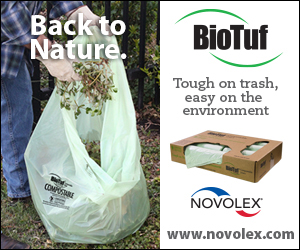
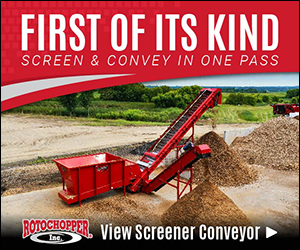

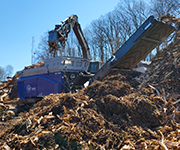

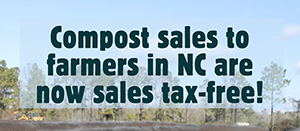
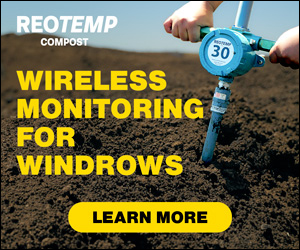
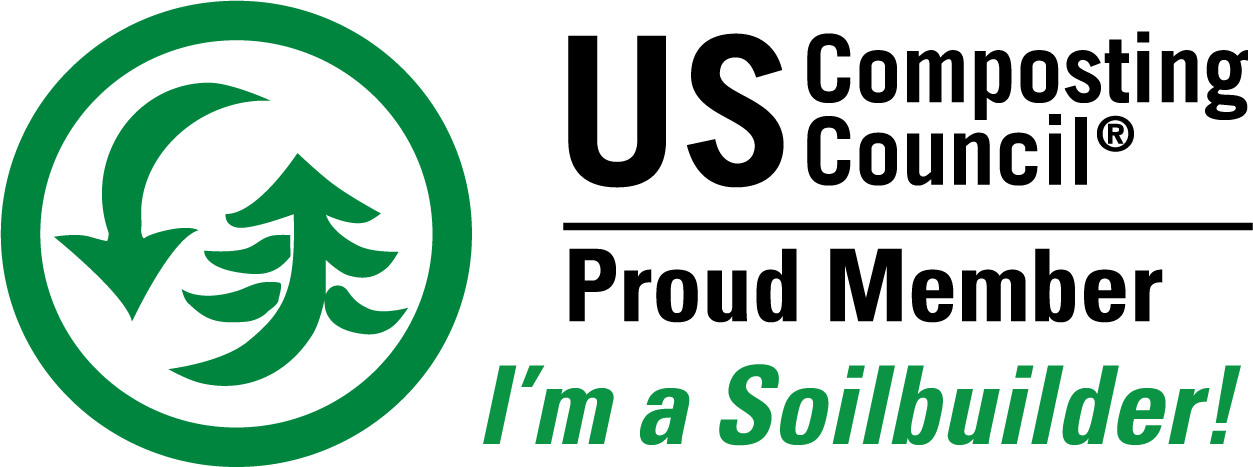 February saw significant growth in the US Composting Council (USCC) membership, with 12 new compost manufacturers and representatives from diverse member types joining our ranks. Additionally, we had an equipment manufacturer, an individual, an advocate, a student, a farm operator, a young professional, and a compost industry affiliate join our community. This surge in membership highlights our growth as an industry and confirms the value of collective industry representation and community.
February saw significant growth in the US Composting Council (USCC) membership, with 12 new compost manufacturers and representatives from diverse member types joining our ranks. Additionally, we had an equipment manufacturer, an individual, an advocate, a student, a farm operator, a young professional, and a compost industry affiliate join our community. This surge in membership highlights our growth as an industry and confirms the value of collective industry representation and community.